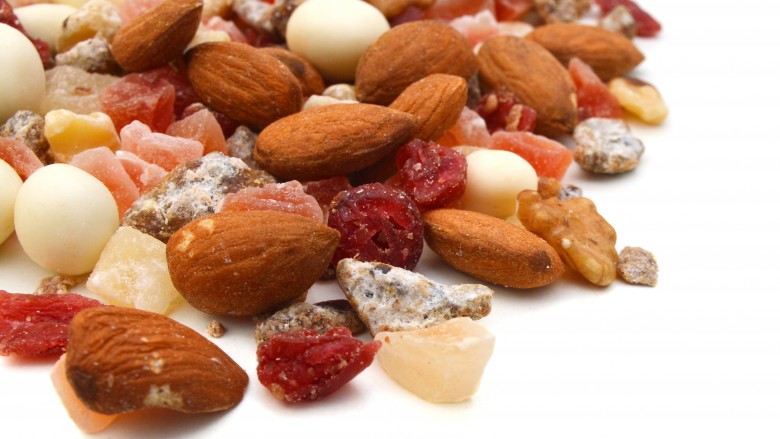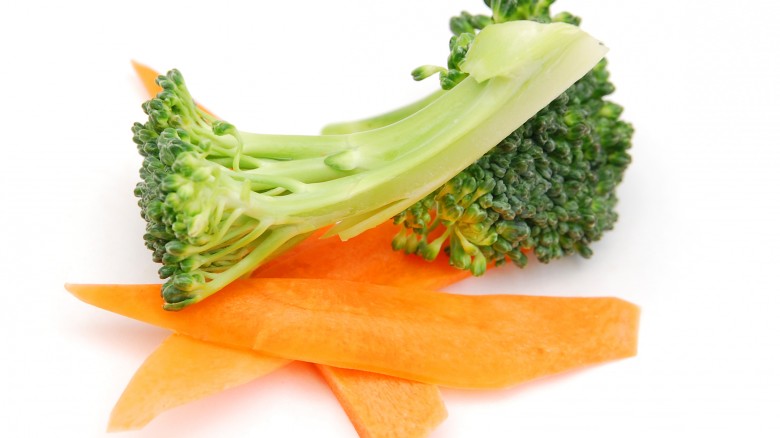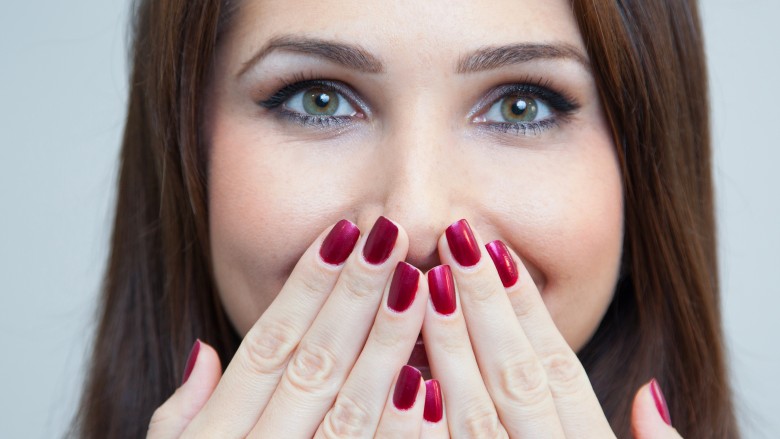Foods That Whiten Teeth Naturally
If a picture is worth a thousand words, then a smile must be worth a million. Smiling doesn't just make us appear happier — let's face it, no one likes a sourpuss — it actually makes others perceive us as more attractive, relaxed and sincere. And while that might be enough of a reason to start flashing those chompers all around town, teeth that are anything less than pearly white can make us a tad self-conscious about showing them off. Sure there are always whitening treatments, but those often come with a hefty price tag and can lead to major tooth sensitivity. Lucky, there's a better way.
By strategically incorporating certain foods into our diet, we can whiten teeth naturally, while also improving our overall health. "Your teeth play several roles when it comes to taking care of your overall health," Nutrition and Wellness Coach Liz Blom, RD, told me. "A balanced diet with focus on whole fruits and vegetables, lean proteins, calcium sources including dairy, and water will not only promote a healthy waist-line but also a beautiful smile."
If you wanna rock a sparkling white smile, here are the foods you need to eat!
Oranges
Chock-full of vitamin C, oranges are low-fat, nutrient-rich and tasty, which makes them the perfect on-the-go snack. But besides being healthy, this citrus fruit also acts as a natural teeth whitener.
"Research shows that the enzyme bromelain in oranges is like a natural stain remover," said Dr. Robert D'Alfonso, DDS, a dentist located in Austin, TX. "Bromelain also helps break up plaque, which, if not prevented, can produce acids that can erode your teeth enamel and lead to dental cavities."
Pineapples
Could your favorite weekend piña colada actually have some health benefits? Eh, not quite. But, eating pineapple (sans the rum) could help take your smile to the next level. Like oranges, pineapples contain the natural stain remover enzyme, bromelain, noted Dr. D' Alfonso.
Blom agreed, explaining, "A study in the International Journal of Dental Hygiene found that bromelain is an effective ingredient in a stain-removing toothpaste. "Pineapple, similar to other citrus fruits also provide that tart factor to increase saliva, to naturally wash teeth clean."
Strawberries
I don't know about you, but I love me some strawberries. So, eating more of them in the name of whiter teeth seems like a win-win. "Strawberries contain an enzyme called malic acid, which acts as a natural astringent to remove surface discoloration," Dr. Leslie Renee Townsend, DDS, Regional Dental Director for Jefferson Dental Care, told me in an interview.
Besides eating them, Dr. D' Alfonso also suggests creating a sweet and tasty DIY teeth whitening treatment with them. "You can try mashing strawberries and leaving them on your teeth for five minutes, and then rinsing them off and brushing your teeth," he told me.
Nuts and seeds
Nuts and seeds are an essential part of any healthy diet. Besides being a great source of plant-based protein, nuts also contain healthy fat and fiber. Eating them might also help keep your teeth healthy, according to Dr. Townsend. "Aside from being an easy and portable snack, nuts and seeds are slightly abrasive enough to disturb surface stains on teeth," she said.
Almonds, for instance, are a particularly tooth-friendly food, thanks to their high levels of calcium, and low sugar content.
Apples
An apple a day may do more than keep the doctor away. It may keep the dentist away too, according to D' Alfonso. "These crunchy fruit work as a natural abrasive scrub for your teeth when you chomp on them," he said.
When it comes to keeping teeth white, Blom is also a big fan of apples, saying "Apples also have a high concentration of malic acid, which is used in some toothpastes. Malic acid increases saliva, which cleans your teeth and helps remove stains."
Celery
D' Alfonso also recommends other crunchy foods including celery. Like apples, celery helps create create saliva. "Saliva prevents plaque from developing, which stains like to stick to," he explained.
Celery is also chock-full of other nutrients, including potassium for a healthy metabolism, calcium, fiber and vitamin K, which is essential for healthy bone and kidney function.
Carrots and broccoli
Blom is a fan of crunchy carrots and broccoli for naturally whiter teeth. "These veggies act like natural stain removers by increasing saliva production, which serves as the mouth's self-cleaning agent," she explained. "They also may kill bacteria that causes bad breath, and the fiber content works to scrub teeth clean."
Both carrots and broccoli are also a great source of vitamin C, calcium and fiber.
White teeth enemies
Just like there are many foods that can help naturally whiten teeth, there are plenty smile saboteurs out there, as well. Dr. Mark Burhenne, creator of Askthedentist.com, recommends avoiding things like coffee, tea, red wine, dark berries, dark berry juice, and soy sauce — on the quest for a whiter smile. "Smoking is also a big factor in tooth yellowing," he added.
Meanwhile, Blom says beware of sweets. "Sugars in cookies, hard candy, and other simple carbohydrates latch onto your teeth and become the main meal for the bacteria in your mouth," she said. "When the bacteria feed off these sugars, they release acids that lead to tooth decay, which may be dark and cause back holes in your teeth." She also suggests staying away from soda, saying, "Sugar-laden beverages act the same as sugar-laden snacks, giving the bacteria in your mouth plenty to feed off of (and thus releasing damaging acids)."
Healthy diet, healthy smile
The bottom line: when we make good food choices, our smiles will naturally be rewarded. "There is a deep connection between the mouth and overall health," Dr. Townsend said. "Good oral hygiene is the gateway to good health throughout the body. On the reverse, poor oral health has been linked to illnesses such as breast cancer, diabetes, heart disease and stroke, to name a few."
And while eating healthier is a top priority (especially if we want whiter teeth), Blom says the benefits of a great smile go even further. "While consumption is important to our survival, so is communication," she notes. "A smile is a universal language. There are too many quotes to choose from when it comes to a smile. In the end, why not keep it healthy and bright?"









